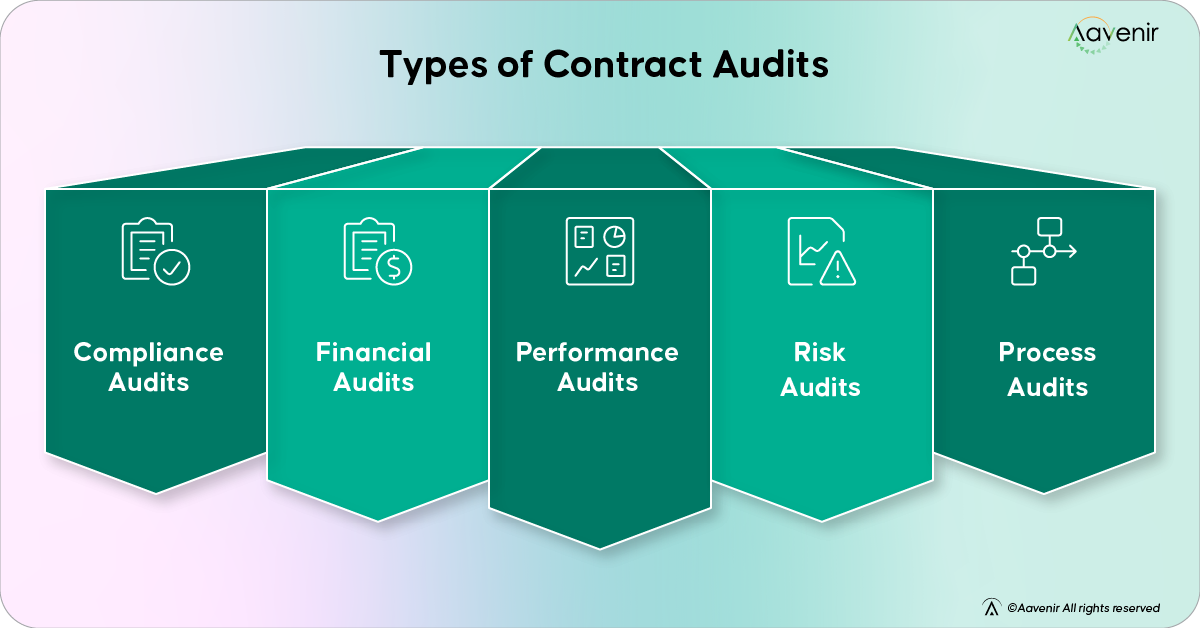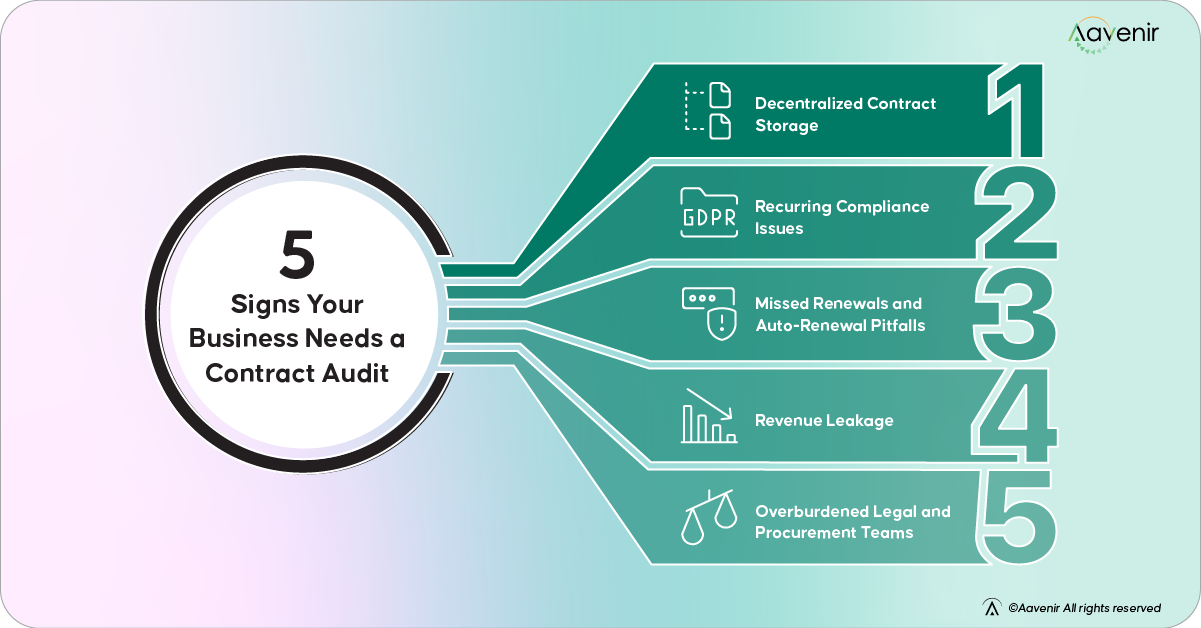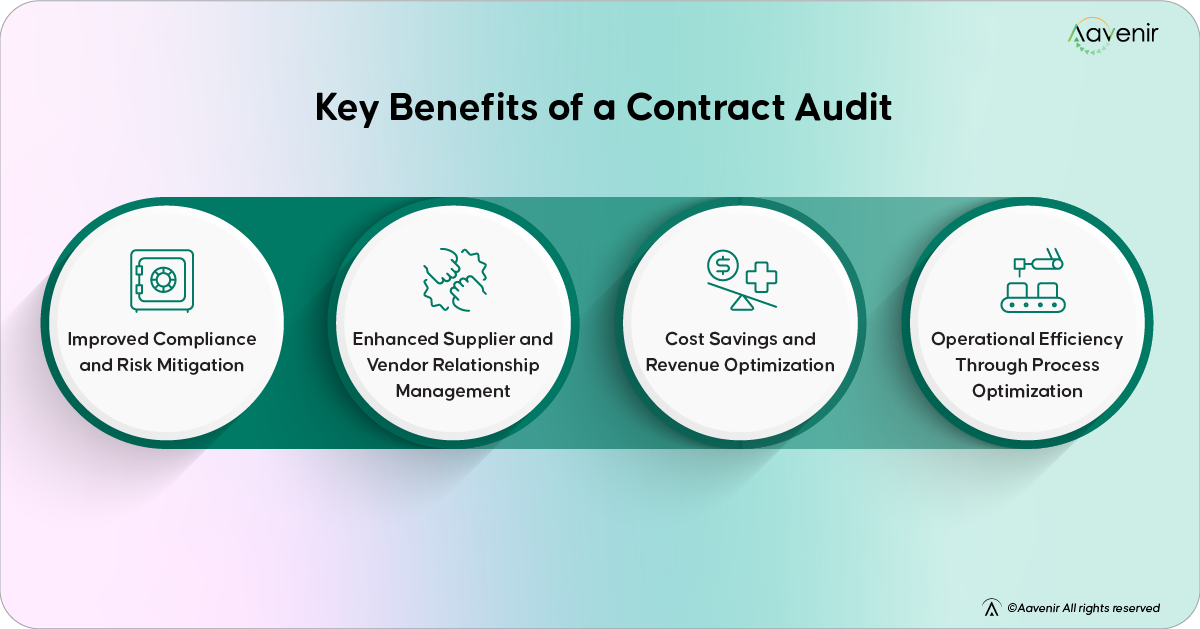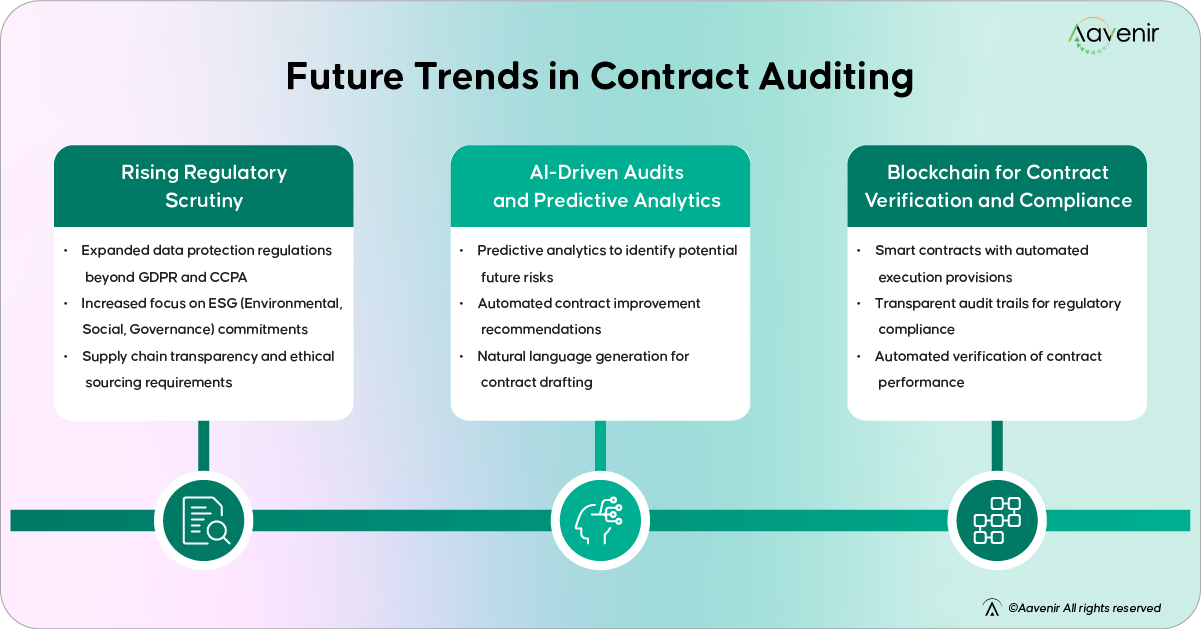Contracts are strategic documents that are the backbone of nearly every business relationship. Whether it’s vendor contracts or employee agreements, these legal documents outline obligations, set expectations, and safeguard organizational interests. However, many companies inadvertently put themselves at considerable risk by ignoring proper contract management and oversight.
As we look ahead to 2025, organizations feel greater pressure to ensure their contracts are compliant due to shifting regulations, increased complexity, and a rising volume of contracts.
This detailed guide delves into the importance of contract audits in business operations, helping professionals assess their organization’s need for one and offering practical insights on how to implement effective contract audit processes.
What is a Contract Audit?
A contract audit thoroughly reviews and evaluates a company’s agreements. It ensures compliance with regulations, highlights potential issues, streamlines financial aspects, and facilitates smooth operations. This isn’t just a quick review of select contracts; a contract audit encompasses a thorough examination of all agreements, not just random fragments.

Different types of Contract Audits
Contract audits come in various forms, each serving specific business objectives:
- Compliance Audits: The focus is on ensuring contracts adhere to relevant laws, regulations, and internal policies.
- Financial Audits: Examine contracts for potential revenue loss, cost savings opportunities, and obligation management.
- Performance Audits: Evaluate whether contracts meet their intended business objectives and deliver expected value.
- Risk Audits: Identify potential legal, operational, and financial risks within contract terms and conditions.
- Process Audits: Review contract management workflows to identify inefficiencies and improvement opportunities.
What is a Contract Review?
A contract review is the process of carefully examining an individual contract to ensure its terms, conditions, and obligations are clear, fair, and legally sound. It typically occurs before signing an agreement to identify potential risks, ambiguities, or unfavorable clauses. Contract reviews help businesses ensure compliance, protect their interests, and negotiate better terms. Unlike a contract audit, which evaluates an entire portfolio of contracts, a contract review focuses on a single agreement at a time.
Contract Review vs. Contract Audit
While these terms are sometimes used interchangeably, they represent different processes:
| Contract Review | Contract Audit |
| Typically examines individual contracts | Evaluates entire contract portfolios |
| Often performed before signing | Conducted on existing contracts |
| Focuses on specific terms and conditions | Examines patterns, systemic issues, and portfolio-wide risks |
| Usually, a one-time activity | Ideally implemented as an ongoing process |
| Often reactive | Proactive and strategic |
Signs Your Business Needs a Contract Audit in 2025
As businesses grow, contracts can often accumulate quickly without proper management systems. Here are some signs that your organization might benefit from a contract audit:

1. Decentralized Contract Storage
One of the biggest issues organizations face is not having a centralized contract repository. When contracts are scattered across shared drives, email inboxes, local computers, and physical file cabinets, visibility becomes virtually impossible.
Consider these scenarios:
- Your legal team spends hours searching for contracts when questions arise
- Different departments maintain separate contract storage systems
- You’re unsure of exactly how many active contracts your organization has
- Accessing historical contract information requires contacting multiple stakeholders
This fragmentation creates significant blind spots in contract management, making it challenging to track obligations, identify risks, or leverage contract data for strategic decision-making.
2. Recurring Compliance Issues
In 2025’s complex regulatory environment, compliance requirements are constantly evolving. Organizations struggling with:
- Frequent regulatory violations related to contract terms
- Difficulty tracking industry-specific compliance requirements
- Inconsistent contract language across similar agreements
- Challenges in demonstrating compliance during audits or examinations
These issues often signal the need for a systematic contract audit to identify compliance gaps and implement standardized approaches to regulatory adherence.
3. Missed Renewals and Auto-Renewal Pitfalls
Contract lifecycle management challenges frequently manifest in problematic renewal scenarios:
- Services continue after the intended termination dates
- Auto-renewals trigger unexpectedly, resulting in unwanted commitments
- Renewal negotiation opportunities are missed due to last-minute discoveries
- Favorable terms from previous agreements aren’t carried forward
These renewal-related issues create unexpected costs and indicate deeper problems in contract visibility and management.
4. Revenue Leakage
The financial implications of poor contract management can be substantial. Warning signs include:
- Difficulty reconciling contract terms with actual invoicing
- Discovering you’re not receiving negotiated discounts or rebates
- Unexpected price increases that don’t align with contract terms
- Paying for services or licenses no longer in use
A comprehensive contract audit can uncover these financial discrepancies, potentially recovering significant revenue and preventing future leakage.
5. Overburdened Legal and Procurement Teams
When your legal and procurement professionals are constantly:
- Responding to urgent contract-related questions
- Manually reviewing similar contracts repeatedly
- Spending excessive time on administrative contract tasks
- Unable to focus on strategic initiatives due to contract management demands
These operational inefficiencies indicate systematic contract management issues that a well-structured audit can address.
4 Key Benefits of a Contract Audit
Implementing a comprehensive contract audit delivers numerous benefits that extend far beyond simple compliance:

1. Improved Compliance and Risk Mitigation
A contract audit provides a systematic approach to identifying and addressing compliance gaps and risks. By thoroughly examining your contract portfolio, you can:
- Ensure alignment with current regulatory requirements
- Identify inconsistent or outdated legal language
- Discover missing clauses that expose your organization to risk
- Detect unfavorable terms that could lead to potential disputes
- Identify contracts requiring immediate attention or remediation
This proactive approach to compliance significantly reduces the likelihood of costly legal disputes, regulatory penalties, and reputational damage.
2. Enhanced Supplier and Vendor Relationship Management
Understanding your contractual relationships is essential for effective vendor management. A contract audit helps you:
- Identify strategic vs. non-strategic vendor relationships
- Consolidate vendors providing similar services
- Leverage volume discounts across the organization
- Standardize service level agreements and performance metrics
- Improve negotiation positions with comprehensive contract data
These insights enable more strategic vendor management, transforming transactional relationships into valuable partnerships.
3. Cost Savings and Revenue Optimization
The financial benefits of contract audits are often substantial:
- Identifying and eliminating duplicate services or subscriptions
- Recovering missed discounts, rebates, or incentives
- Optimizing renewal timing to maximize negotiating leverage
- Consolidating contracts to achieve economies of scale
- Standardizing pricing across similar agreements
Organizations frequently discover that the cost savings from a single contract audit far exceed the investment in the audit process.
4. Operational Efficiency Through Process Optimization
Beyond financial benefits, contract audits reveal opportunities to streamline operations:
- Standardizing contract templates and approval workflows
- Identifying bottlenecks in contract processes
- Establishing clear roles and responsibilities for contract management
- Creating consistent approaches to contract lifecycle management
- Implementing automation for routine contract tasks
These efficiency gains reduce administrative burdens while improving contract quality and consistency.
How to Conduct a Contract Audit: A Step-by-Step Guide
Implementing a successful contract audit requires a structured approach. Here’s a comprehensive framework to guide your process:
Step 1: Gather and Centralize All Contracts
The foundation of any effective contract audit is comprehensive visibility. Begin by:
- Conducting a thorough search across all departments and storage locations
- Implementing a centralized contract repository (ideally cloud-based)
- Capturing key metadata for each contract (parties, dates, value, type)
- Scanning physical documents for digital access
- Establishing protocols for adding new contracts to the repository
While potentially time-consuming, this centralization effort provides the essential foundation for all subsequent audit activities.
Step 2: Categorize and Prioritize Based on Risk and Value
Not all contracts carry equal importance. Develop a prioritization framework considering:
- Contract value (financial impact)
- Strategic importance (business criticality)
- Risk profile (potential legal or operational exposure)
- Complexity (number of variables and stakeholders)
- Renewal timing (proximity of decision points)
This categorization enables you to focus initial audit efforts on high-impact agreements while establishing a roadmap for comprehensive coverage.
Step 3: Review for Compliance, Financial Risks, and Efficiency Gaps
With contracts prioritized, conduct systematic reviews focusing on:
Compliance Analysis:
- Regulatory requirements specific to your industry
- Data protection and privacy provisions
- Intellectual property protections
- Environmental and social responsibility clauses
- Governance and reporting obligations
Financial Review:
- Pricing structures and discount mechanisms
- Payment terms and conditions
- Service level agreements and performance penalties
- Renewal terms and price escalation clauses
- Value capture opportunities and leakage points
Operational Assessment:
- Contract fulfillment processes
- Monitoring and reporting mechanisms
- Internal controls and approval workflows
- Responsibility assignments
- Documentation and record-keeping practices
This multi-dimensional review identifies immediate intervention needs while highlighting systemic improvement opportunities.
Step 4: Identify Automation Opportunities in Contract Workflows
Modern contract management increasingly leverages technology for efficiency and effectiveness. Evaluate opportunities for:
- Automated contract creation and assembly
- AI-powered contract analysis and risk identification
- Workflow automation for approvals and renewals
- Performance monitoring and obligation tracking
- Integration with procurement and financial systems
These automation initiatives can dramatically reduce administrative burdens while improving contract quality and compliance.
Step 5: Establish a Continuous Monitoring Process
Effective contract audits aren’t one-time events but ongoing processes. Implement:
- Regular review schedules based on contract priority
- Automated alerts for key dates and milestones
- Performance monitoring against contractual obligations
- Periodic compliance verification
- Continuous improvement mechanisms for contract processes
This sustainable approach ensures that contract management remains proactive rather than reactive.
Role of AI and CLM Software in Contract Auditing
The evolution of contract lifecycle management (CLM) technology has revolutionized the contract audit process. Modern AI-powered CLM platforms offer unprecedented capabilities:
AI-Powered Contract Analysis
Advanced natural language processing algorithms can:
- Review thousands of contracts in a fraction of the time required for manual review
- Identify non-standard clauses and potential risks
- Extract key terms and obligations automatically
- Flag inconsistencies across similar agreements
- Provide risk scores based on contract language analysis
These capabilities dramatically accelerate the audit process while improving accuracy and consistency.
The Impact of AI-Driven Compliance Tracking
Beyond initial audits, AI-powered compliance monitoring provides ongoing value:
- Automated tracking of contractual obligations and deadlines
- Real-time alerts for potential compliance issues
- Continuous monitoring of changing regulatory requirements
- Proactive identification of renewal opportunities
- Data-driven insights for strategic decision-making
This transition from reactive to proactive contract management represents a significant competitive advantage in today’s dynamic business environment.
Future Trends in Contract Auditing
As we navigate through 2025, several emerging trends are reshaping the contract audit landscape:

Rising Regulatory Scrutiny
Regulatory requirements continue to evolve at unprecedented rates:
- Expanded data protection regulations beyond GDPR and CCPA
- Increased focus on ESG (Environmental, Social, Governance) commitments
- Supply chain transparency and ethical sourcing requirements
- Industry-specific regulatory frameworks with contract implications
- Cross-border compliance considerations
Organizations with robust contract audit processes are better positioned to adapt to these evolving requirements.
AI-Driven Audits and Predictive Analytics
The next generation of contract audit tools leverages advanced AI capabilities:
- Predictive analytics to identify potential future risks
- Automated contract improvement recommendations
- Natural language generation for contract drafting
- Comparison against industry benchmarks and best practices
- Integration with broader enterprise risk management systems
These capabilities transform contract audits from retrospective reviews to strategic business tools.
Is It Time for Your Business to Conduct a Contract Audit?
As we’ve explored throughout this guide, contract audits provide essential visibility into one of your organization’s most critical assets: your contractual relationships. The benefits extend far beyond simple compliance, offering opportunities for:
- Risk mitigation and enhanced compliance
- Significant cost savings and revenue optimization
- Improved operational efficiency
- Strategic vendor management
- Competitive advantage through proactive contract management
The question isn’t whether your organization can afford to conduct a contract audit, but rather whether it can afford not to.
Take the Next Step in Contract Excellence
Ready to unlock the full potential of your contract portfolio? Discover how Aavenir’s AI-powered Contract Lifecycle Management platform can streamline your contract audit process, mitigate risks, and drive operational excellence.
Request a personalized demo today to see how our intelligent contract management solutions can transform your contract auditing and management approach.
Frequently Asked Questions
1. How often should a business conduct a contract audit?
The frequency of contract audits depends on factors like industry regulations, contract volume, and business complexity. However, most organizations benefit from conducting a full contract audit at least once a year, with ongoing monitoring of high-risk or high-value contracts.
2. What are the common risks of not conducting a contract audit?
Failing to conduct regular contract audits can lead to compliance violations, financial losses due to revenue leakage, missed renewal opportunities, legal disputes, and inefficient contract management. These risks can ultimately harm an organization’s financial health and reputation.
3. Can small businesses benefit from contract audits, or are they only for large enterprises?
Absolutely! Contract audits are beneficial for businesses of all sizes. Small businesses can gain better control over their contracts, prevent unnecessary expenses, and ensure compliance with industry regulations, helping them operate more efficiently and competitively.





